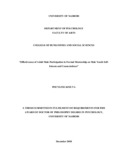| dc.contributor.author | Kinuva, Pocyline | |
| dc.date.accessioned | 2019-01-29T11:09:17Z | |
| dc.date.available | 2019-01-29T11:09:17Z | |
| dc.date.issued | 2018 | |
| dc.identifier.uri | http://hdl.handle.net/11295/105844 | |
| dc.description.abstract | This study explored the effectiveness of adult male formal mentorship on male youth selfesteem
and connectedness. Extant literature indicates that formal mentorship is effective in
mitigating the effects of male youth risk factors; leading to heightened self-esteem and
connectedness. The current research was carried out in order to establish whether this can be
the case in Kiserian of Kajiado County. This study utilized qualitative and quantitative
methodologies. The research design was quasi-experimental with a treatment and control
group for the male youth (mentees). Each group was composed of 26 participants; drawn
from three age categories ranging between 15 and 23 years and from diverse ethnic
backgrounds. There were 13 mentors and each one was assigned two mentees for speed
mentorship. The sample of 65 participants was drawn from Kiserian town and selected using
purposive and snowball sampling methods. The research instruments included three
questionnaires and four Focus Group Discussion guides. One questionnaire was designed for
the mentors; while the two were for the mentees; a pretest and posttest one; each pair was
applied to both the treatment and control groups. The mentors and mentees had two Focus
Group Discussions each. The SAVE mentorship model was utilized for the speed mentorship
intervention. A pilot study was conducted before the study commenced. The reliability tests
carried out before the main study using Cronbach’s Coefficient Alfa formula found the
instruments to be within the acceptable range. Statistical Package for Social Sciences (SPSS)
version 20 for windows was employed in descriptive and inferential data analysis. Statistical
techniques made use of comprised, one- way ANOVA and ANCOVA. The hypotheses were
tested at α = 0.05. ANOVA analysis found adult males in Kiserian to be only moderately
(M=33.84 out of a possible 45 points) involved in male youth affairs in the community. The
differences in formal mentorship participation however, were found not to be significant
across age and cultural backgrounds of the mentors. Further, ANCOVA analysis showed that
male youth self-esteem (from 16.81 to 24.70) and connectedness (from 29.31 to 38.12 from
29.31 to 38.12) increased significantly after the mentorship intervention. The study also
established that the age of male youth participants had no statistically significant effect on
their self-esteem and connectedness. Though the cultural background of mentees did not
significantly determine their connectedness; it nonetheless interposed their self-esteem
considerably. The concerted efforts of all stakeholders in enhancing male youth self-esteem
and connectedness are imperative. The study recommends that the government takes the lead
in urgently creating awareness on the importance and possibility of male youth formal
mentorship by adult males. Besides, programs for mobilizing and training adult male mentors
and opportunities to mentor male youth should be created by the government rather than be
left to the scattered and haphazard efforts of other stakeholders. | en_US |
| dc.language.iso | en | en_US |
| dc.publisher | University of Nairobi | en_US |
| dc.rights | Attribution-NonCommercial-NoDerivs 3.0 United States | * |
| dc.rights.uri | http://creativecommons.org/licenses/by-nc-nd/3.0/us/ | * |
| dc.title | Effectiveness of Adult Male Participation in Formal Mentorship on Male Youth Self- Esteem and Connectedness” | en_US |
| dc.type | Thesis | en_US |



